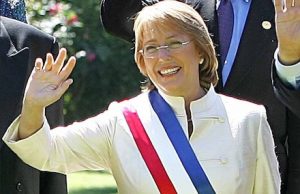 [1]This post was co-authored by Quinnie Lin, a Law Clerk at Miller & Chevalier.
[1]This post was co-authored by Quinnie Lin, a Law Clerk at Miller & Chevalier.
On March 10, 2015, Chile’s President Michelle Bachelet established the Presidential Advisory Council against Corruption, Influence-Peddling, and Conflicts of Interest (“Consejo Asesor Presidencial contra los Conflictos de Interés, el Tráfico de Influencias, y la Corrupción”) (“Council”). The impetus for founding the Council was a series of political scandals in recent years that resulted in plummeting public confidence in the Chilean government.
In January of 2015, authorities investigated Andrés Velasco, the Finance Minister during Bachelet’s first term, for alleged illegal financing of his 2013 political campaign from the business group, Penta. In February of 2015, a whistleblower disclosed that SQM, a chemical production company headed by Julio Ponce Lerou, the ex-son-in-law of Chile’s former dictator Augusto Pinochet, allegedly obtained tax reductions fraudulently. Other scandals, including one which involved Bachelet’s son and daughter-in-law, shook the public’s trust in a country that has historically prided itself as a model for political transparency in Latin America. Chile has consistently ranked in the 20s out of 168 countries on Transparency International’s Corruption Perceptions Index in recent years. However, a survey showed that public confidence in the government, the National Congress of Chile (“Congress”) and political parties fell 19%, 10.5% and 5.5%, respectively, between 2002 and 2015, according to the Research Center of Public Studies (CEP) national opinion survey.
The Council consisted of 16 professionals of diverse backgrounds, including a former president of the Central Bank of Chile and a former Pinochet cabinet member. The head of the Council was Eduardo Engel, an economics professor at the University of Chile, who holds two doctorate degrees from MIT and Stanford. According to Engel, who spoke [2] at Washington DC’s Woodrow Wilson Center’s Latin America Program on September 7, 2016, no political leaders or business leaders were allowed on the Council because of the fear that they would influence the proposed reforms. After 45 days of deliberation, the Council released a report [3] in Spanish which put forth 236 proposals, 92% of which had the unanimous support of the Council members.
The report covered five main areas: preventing corruption, regulating conflicts of interest, financing politics to strengthen democracy, market confidence, and integrity, ethics and citizen rights. In May and June of 2016, 21 of the legal initiatives from the report were proposed in Congress. Since keeping track of the numerous legislative proposals would be difficult for ordinary citizens, two nonprofits, Espacio Publico [4] and Ciudadano Inteligente [5], launched the Anticorruption Observatory [6], a website to evaluate the progress of the legislative proposals. On the website, the proposed laws were rated on the extent to which they captured what the Council proposed.
To date, the Chilean Congress has successfully passed laws in the areas of disclosing interest and private assets, civic and ethics education, and campaign finance. The areas where legislative proposals are making progress include reform of the civil service, prevention of corruption in land use, empowering regulators, reforming regulation bodies and strengthening the corporate governance of firms. Areas with little or no progress include revolving door regulations, municipality reform, reform of public procurement and defense spending and the creation of the Office of Ombudsman. Engel credited the success of the Council’s proposals to the role that Chilean civil society and media have played in reporting on the political scandals and supporting the work of the Council.
The work of the Council appears to be contributing to a restoration of some of the public’s trust in the Chilean government. In a May 2016 survey, 60% of the respondents answered “yes” to the question, “Do you think that Congress passing most of the measures proposed by the [Council] will restore public confidence in politics?” The success of the Council’s proposals led Engel to conclude, “[Political] scandals are opportunities if you approach them correctly.”
The opinions expressed in this post are those of the author in his or her individual capacity, and do not necessarily represent the views of anyone else, including the entities with which the author is affiliated, the author’s employers, other contributors, FCPAméricas, or its advertisers. The information in the FCPAméricas blog is intended for public discussion and educational purposes only. It is not intended to provide legal advice to its readers and does not create an attorney-client relationship. It does not seek to describe or convey the quality of legal services. FCPAméricas encourages readers to seek qualified legal counsel regarding anti-corruption laws or any other legal issue. FCPAméricas gives permission to link, post, distribute, or reference this article for any lawful purpose, provided attribution is made to the author and to FCPAméricas LLC.
© 2016 FCPAméricas, LLC